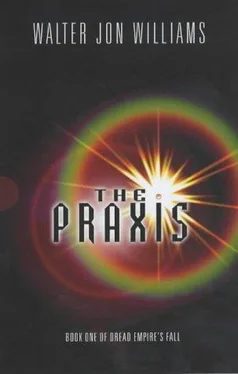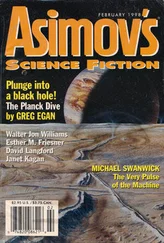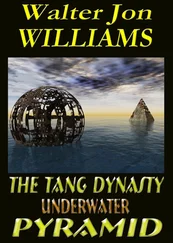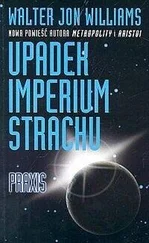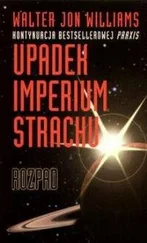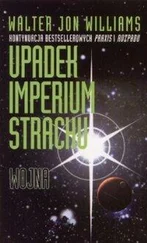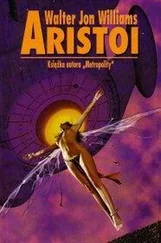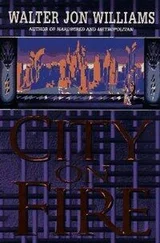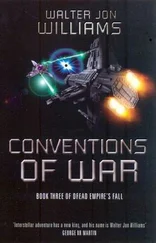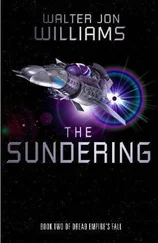“When they finally acted, they fired over two hundred missiles,” Jarlath said. “That isn’t the act of a crippled force.”
“It was only Fanaghee’s two original squadrons that fired. The captured ships weren’t ready.”
“We can’t assume they’re not readynow.”
By the time Lord Commander Tork’s answer came, Jarlath had finished his meal and gone on to dessert, some meaty marrow bones. He sucked out the contents and crunched the remainder with his back molars. His teeth were still strong, he thought; he had a lot of years left.
“Lord Commander Jarlath.” There was an ominous, discordant chime in Tork’s voice. “You must dosomething. I have served the Fleet for over forty years, and I understand your reasons even if I disagree with them. But the convocates don’t think as we do. They want actionnow, and if you don’t provide it, they mayorder it, and who knows what form their orders will take? The vulnerability of Hone-bar has some of them panicked, and I’m afraid that some of the people—even the people on the Board—may not be thinking straight. This afternoon they were within a single vote of ordering you to detach part of your fleet to guard Hone-bar.”
Tork leaned toward the camera pickups, his fixed, gray expression mournful, but his voice chiming with suppressed passion.
“Hone-bar may declare for the rebels out of sheer terror, and the Reach will follow if Hone-bar defects. For pity’s sake, detach a squadron to defend the Reach, or launch the attack on Magaria and trust yourPraxis — class ships to annihilate the enemy. I would prefer the latter, but I’ll leave it up to you.”
Jarlath considered this appeal as his molars crushed a particularly delectable marrow bone. The blessedly low gravity and fine meal had given him a feeling of well-being, and he thought he might as well leave Tork with the feeling he had accomplished something.
“I want to question Martinez myself about any damage he may have done,” he said. “In the meantime I’ll order a harder acceleration. If I’m going to Magaria, then I’m going to go infast.”
Jarlath gave the orders, unaware that he had just crossed an invisible line, the line between refusing absolutely to go to Magaria and a willingness to contemplate the attack.
Once he had crossed that line, Jarlath found it increasingly difficult to return.
Most ofCorona’s transit to Zanshaa was rather pleasant. There was some suspense at the start, when Martinez sent his report to the repeating signal station at the far side of the Paswal system and requested all the recent news. It was many hours before bulletins of the failed revolt at Zanshaa arrived, along with information that the Home Fleet still stood between the Naxids and the capital.
Coronahad a home to return to. Once he knew that, Martinez felt he could enjoy himself in his new command.
He set watches and kept the ship at partial gravity for the first six days, allowing everyone a chance to recover from the exhaustion of fifteen days’ desperate acceleration.
Except for the lonely crews of the two wormhole maintenance and relay stations, Paswal was an uninhabited system, dead planets surrounding a bright energetic star in the midst of a globular cluster. It had never been determined exactly where Paswal was in relation to anywhere else in the empire: wormholes could lead anywhere in the universe, and to practically any time. The video views of the outside were spectacular, the cluster’s million stars so closely packed that they looked like a shining wall of diamonds. Paswal didn’t experience anything like true darkness, only a kind of twilight, with the near stars great fiery gems amid the background of brilliants. Martinez sometimes slept with a virtual rig projecting the exterior view into his mind, so that falling asleep and waking were both marked by the blazon of the night, and a million stars walked through his peaceful dreams.
It was three days before he succumbed to the temptation to look at his confidential records. Tarafah’s key opened these, as well as those of everyone else, and it occurred to him that if he was to be the captain ofCorona, he should be familiar with the records of his crew. So, virtuously, he began with the cadets, then worked his way through the warrant and petty officers and on to the recruits. There were few surprises, though it did startle him to discover that Cadet Vonderheydte had been married and divorced twice in his brief service career, which barely added up to three years.
After this display of rectitude, Martinez called up his own records, and discovered that Tarafah had described him as “an efficient officer, diligent in his duties, though needing more polish in social situations.” The estimate nettled him. When had heever been in a social situation with the captain? he wondered. Where had Tarafah formed that judgment? He thought about erasing the last bit, then decided it was too dangerous. Someone might look at the time stamp and discover that the report had been modified on a date when Tarafah was in the hands of the enemy.
Vexed, he went on to Enderby’s report, which was longer and more detailed. “An officer of exceptional talent and ability,” it concluded. “He will have an excellent career if he can restrain his ambition from scheming for awards that would fall to him naturally in the fullness of time.”
Nowthat, he had to admit, was fair.
Martinez glowed, however, when he read Enderby’s final testament, in which he requested that the Fleet Control Board promote Martinez as soon as a suitable command became vacant. The old manhad liked him, had done his best to assure that he’d be promoted…in the fullness oftime.Perhaps even the transfer to the Second Fleet aboardCorona was aimed at assisting his chances: vacancies tended to occur more often on the more remote stations. In charity with all the universe, Martinez decided this had to be true.
The glow of pleasure that accompanied this discovery accompanied him through his first few days of command.
On the seventh day he decided the crew’s vacation was over. He kicked the acceleration up to a full gravity and started a regular series of inspections, each of the ship’s departments in turn. He assigned punishments to Zhou, Ahmet, and Knadjian, the ship’s bad lads—they were to repair all the damage that had been done to the quarters of the captain and the premier lieutenant. As the rooms had been comprehensively destroyed during the search for the command keys, the repairs would take at least till the end of the voyage—and of course he made them stand regular watches as well, so the repair jobs came out of what otherwise would have been their free time. He put Saavedra, the captain’s secretary, in charge of the three for this act of rehabilitation, because he knew that the precise and exacting Saavedra was exactly the sort of person whose fastidious ways would most annoy the malefactors.
A few days into the new regime, he was informed that the Convocation had awarded him the Golden Orb. Alikhan and Maheshwari slipped away for a few hours to the frigate’s machine shop, and at dinner that afternoon made Martinez a presentation.
Martinez had seen a Golden Orb in the Hall of Honor of the Fleet Museum in Zanshaa’s Lower Town: an ornate baton on top of which was mounted a transparent sphere filled with a dense golden liquid that swirled and eddied in reaction to motion, even the motion of a cadet walking past the display. The patterns inside the sphere were fascinating, intricate, the cloud swirls of a gas giant in miniature, patterns wrapped inside patterns clothed inside patterns, an infinite regression of fractals.
The thing about the orb that had most impressed Martinez, however, was that superior officers—evenconvocates — had to brace and salute a Golden Orb when its recipient walked past.That was the sort of power he suspected he could use, abuse, and enjoy.
Читать дальше
